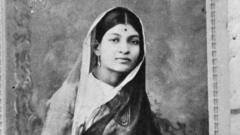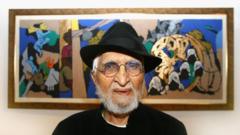**On January 12, 1925, the murder of Abdul Kadir Bawla stirred a complex narrative of love, power, and betrayal, sparking an international scandal that ended a regal monarchy.**
**Murder That Reverberated Through Colonial India: A Century Later**

**Murder That Reverberated Through Colonial India: A Century Later**
**Remembering the shocking case that brought down a king and altered Britain’s reign in India**
One hundred years ago, on January 12, 1925, a single act of violence in colonial India ignited a firestorm of societal upheaval, political tension, and personal tragedy. Abdul Kadir Bawla, a prominent textile magnate and the youngest municipal official in Bombay (now Mumbai), was murdered in an affluent part of the city during a fateful car ride with his companion, Mumtaz Begum. In what was described by contemporary media as possibly "the most sensational crime committed in British India," the repercussions of this murder rippled through social classes and ranks, leading to the abdication of a king.
On that fateful evening, Bawla, aged 25, and the 22-year-old Mumtaz Begum—a courtesan in flight from the royal confines of the princely state of Indore—were traveling with three others in the upscale Malabar Hill neighborhood when their vehicle was ambushed. As another car deliberately collided with theirs, assailants exited and shouted for Mumtaz Begum to be taken away. Witness accounts revealed that Bawla was shot multiple times before passing away hours later in the hospital, despite the swift response of British soldiers who were nearby.
The attackers had ulterior motives, likely intending to abduct Mumtaz Begum, whose beauty and mysterious past garnered substantial media attention. Reports indicated that Bawla had received numerous threats for taking her in, as Mumtaz Begum had a controversial history involving Maharaja Tukoji Rao Holkar III of Indore, who had previously tried unsuccessfully to control her life and relationships.
As the media frenzy unfolded, the investigation into Bawla's murder revealed troubling ties to the Maharaja, a powerful ally to the British Crown. Evidence emerged implicating several of Indore's men, resulting in a high-profile trial that captivated the public. The trial drew thousands of eyes, and even the future founder of Pakistan, Muhammad Ali Jinnah, represented one of the accused — a high-ranking official of the Indore army.
Despite the overwhelming pressure on the investigation, including concerns from Indian lawmakers and community leaders, Bawla's death fundamentally scared the British government. With public sentiment—and potential unrest—agitating against them, the British officials presented Majaraja Holkar with a choice: an inquiry into his involvement or abdication. He chose to abdicate his throne, laying the groundwork for a legacy often drowned out by the sensationalism of the case.
Subsequently, Mumtaz Begum sought new beginnings in Hollywood before vanishing from public view, her tumultuous journey echoing themes of love, power, and personal sacrifice in a period of extraordinary transformation for India. The case stands as a stark reminder of colonial complexities, showcasing how the intertwined fates of an influential businessman, a courtesan, and a monarch altered the trajectory of history in British India.



















